When you see Kent mangoes in a greengrocer at the moment, priced at R50 (2.38 euro) for a tree-ripened fruit, you are looking at the only mangoes this time of year harvested in South Africa and produced under close to impossible conditions.
“I don’t know if we even have six hours of electricity a day,” says Danie Basson from the farm Gladdekoppies (trading as Windbult Boerdery) for which his great-great-grandfather received the title deed in 1886 from Paul Kruger, president of one of the erstwhile Boer Republics.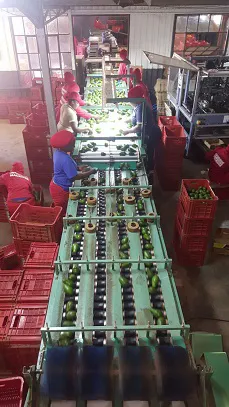 Then there are seven farms in the lush Levubu Valley run by Danie, five of those owned by the Ravele Communal Property Association (CPA), which he has managed for the past fifteen years at the behest of the government and of the community itself.
Then there are seven farms in the lush Levubu Valley run by Danie, five of those owned by the Ravele Communal Property Association (CPA), which he has managed for the past fifteen years at the behest of the government and of the community itself.
Right: sorting avocados
It is, he says, the only and most successful land reform farm in Limpopo Province under community management.
“There are others where the land is leased to other farmers in Limpopo that are successful but the profit of the business is not to the sole benefit of the land owners, the specific Communal Property Associations,” Danie says.
The Ravele CPA, representing 312 families, has the only farm among the highly-developed Levubu fruit farms handed back to beneficiary communities that is still highly functioning.
Containing family and clan politics from spilling over into farm operations is exhausting, a lonely pursuit for Danie, the only white farmer in the Valley still actively involved with a land reform project.
Apart from his work with the community farms and the out-of-season mangoes on his own production units, Danie and his sons produce avocados for the local and export markets and, to a smaller degree than years ago, bananas which are sold in their region to school feeding programmes.
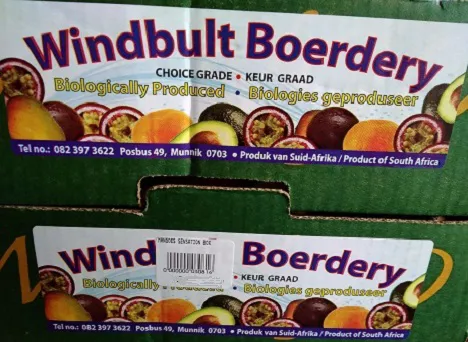
Diesel costs wreck the bottom line (and the environment), but electricity bills don’t decrease
Speaking to FreshPlaza, they had had no electricity the previous day because of a storm that blew over an electrical pole. On this day the power was cut at 7am, according to the loadshedding schedule, due to come on at 11:30am but before noon, there was no electricity and they were, again, reliant on a diesel generator.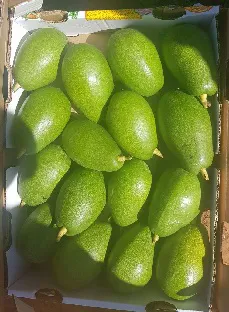 Danie says they never know when they will have power on the main electricity line, due as much to the severe institutionalized power cuts affecting the whole country as to regional electricity infrastructure failing after years of neglect.
Danie says they never know when they will have power on the main electricity line, due as much to the severe institutionalized power cuts affecting the whole country as to regional electricity infrastructure failing after years of neglect.
He reckons the last time they had a day with no power cuts was sometime last year.
“Whether you have power or not, the electricity bill isn’t coming down. The moment the power comes back on, you have to get your irrigation going without delay. When you irrigate, you’re talking of 50kWatt, 60kWatt pumps and you have four or five on one pump station. In the past, you scheduled your pumps to switch on at half-hour intervals to avoid maximum demand – now you don’t have the time to stagger the sequence,” he explains.
“Now, when the power comes back on, you’re pulling maximum power from the start and consequently you are charged for maximum demand for all of the hours that you manage to irrigate, even when your actual use come down.”
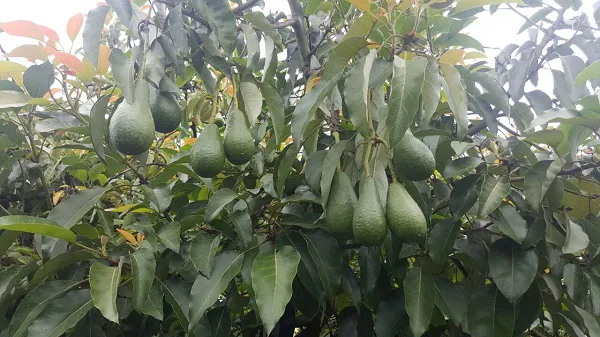
"Switching on a generator to produce a crop costs you double"
Water is the limiting factor and without power, there is no irrigation hence no water (just as: no power, no phone signal).
He sees more trouble ahead.
“Right now, we’re ‘only’ at stage six of loadshedding. When the power system finally conks in, diesel can’t be pumped up from the coast in the pipelines up to us. So then, even if you have a generator but you have no diesel it doesn’t help you – unless you have the R43 million [over 2 million euros] that it costs to get 1,000 hectares under solar panels.”
As an example of the effect of the chronic power cuts on pivot irrigation and consequently on yields, Danie tells of onion farmers now irrigating a half circle instead of a full circle, effectively reducing the yield by half (leading to current record onion prices as FreshPlaza recently reported).
“When you switch on a generator to produce your crop it costs you double, but you’re not getting double the value of the product. That’s our dilemma.”
Another casualty of loadshedding is their macadamia dehusking.
Almost 50 avo and macadamia farms for sale in Soutpansberg area
Packaging prices are so high – almost R47 for a 20kg banana carton – that Danie prefers picking straight into a local ripener’s crates, and he sends no more bananas to the municipal markets.
As for transport of their mangoes which they send to markets across the country, Danie says transport costs are killing them: sending down to the Cape costs them double, but they cannot expect double the price.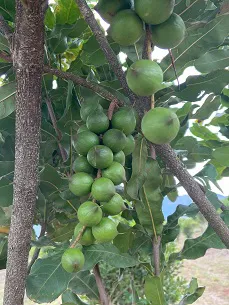 When the good times were rolling in the macadamia industry, banks were solicitous in offering their assistance, he observes, but when China closed due to Covid the macadamia price more than halved.
When the good times were rolling in the macadamia industry, banks were solicitous in offering their assistance, he observes, but when China closed due to Covid the macadamia price more than halved.
Moreover, payment for delivered macadamias was delayed and in some cases not even received, and banks started closing down farmers’ overdraft facilities.
“Last year this time there wasn’t one macadamia farm for sale in the Soutpansberg area. Now there are 47 avocado and macadamia nut farms on the market. It’s frightening. People out there don’t know what’s going on in agriculture. I see a critical threat to food security in the country.”
The past few months have been exceptionally tough on farming communities.
“In my enterprise half of my people work for three months and go on UIF [unemployment insurance] for three months. I don’t want to lose my people but I can’t afford it, even though I farm some of the highest-value products out there, avocados, macadamias.”
He foresees a time when there’s not much to buy even if you have the money but for the moment farmers like Danie are keeping a thousand balls in the air with no government assistance.
For more information:
Danie Basson
Windbult Boerdery
Email: d.basson@xpress.co.za
